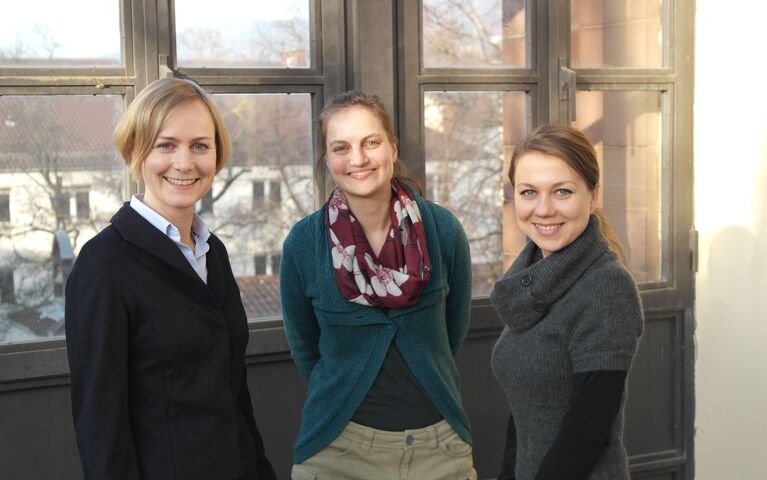Social neuroendocrinology
Neurobiology and biopsychology of social interaction and health
Working group
Our research focuses on the relationship between social relationships (especially couple relationships) and mental as well as physical health.
On the one hand, we are investigating how hormones (e.g. oxytocin or sex hormones) influence couple behavior by using experimental aproach such as administration of synthetic hormones and by the analysis of varying endogenous hormone levels. On the other hand, we are interested in how behaviour in partnerships influences biological parameters (e.g. corticosteroids, sex hormones, epigenetic changes, neurophysiological markers) in healthy and patient populations.
We want to gain a deeper understanding of these processes and make this knowledge applicable in clinical interventions.
STUDY "SOCIAL MODULATION OF CHRONIC LOWER ABDOMINAL PAIN"
Endometriosis is a complex disease that affects 10-15% of all women of childbearing age. Chronic pain is the main symptom of the disease. Social factors, such as living together in a relationship, influence pain management and the degree of stress caused by the disease.
Aim and process of the study
The study investigates the influence of social interactions between endometriosis patients and their partner on the processing of chronic lower abdominal pain. This is done with the help of short everyday life interviews (EMA) (twice 7 days with a 3-week break) and a mini-couple intervention. In addition, we are investigating the role of the hormone oxytocin using saliva samples.
The study will be remunerated with 150 euros/person.
Do you wish to participate?
We are looking for women with diagnosed endometriosis and their partner. Participation is possible if:
- you are participating as a couple
- you are between 18 and 45 years old
- the relationship has lasted longer than 6 months and you live together as a couple
- the person diagnosed with endometriosis has a monthly menstrual cycle
- there are no additional diagnoses of other chronic pain disorders
- you are not pregnant
- you speak German
If you are interested or have any questions, please contact us by email: sip(at)med.uni-heidelberg.de
We look forward to hearing from you!
Heidelberg University Hospital
M.Sc. Zoe Wörner
Prof. B. Ditzen
| Term | 2024 until 2026 |
| Management: | Prof Dr Beate Ditzen |
| Contact person: | Zoe Wörner |
| Funded by: | DFG SFB1158 |
Effects of quarantine and contact reduction measures on mental health in the context of the Covid-19 pandemic
Due to contact restrictions and social distancing to prevent Covid-19, the health-promoting effects of social relationships are currently reduced. At the same time, the threats posed by the disease and its social and economic consequences have increased significantly.
On a psychobiological level, the effect of social support is mediated by the bodily stress systems, including the neuropeptide oxytocin, the steroid hormone cortisol and the catecholamines of the sympathetic nervous system. During the current crisis, we would like to investigate the effects of a) the subjective threat of the virus on individuals, couples and families and b) the simultaneous restriction of social contact, through the collection of saliva samples in participants' daily lives.
| Term: | 2018 - 2021 |
| Management: | Beate Ditzen |
| Contact persons: | Ekaterina Schneider, Dora Hopf, Corina Aguilar-Raab, Monika Eckstein |
| Funding through: | SFB1158 |
Neural correlates of couple interaction*
In cooperation with the Department of Clinical Psychology (Head: Peter Kirsch, Ph.D.) of the Central Institute of Mental Health in Mannheim (ZI Mannheim), we investigate the neurophysiological reactions of both partners during instructed standardized emotional dyadic interaction. Our focus is on the synchronization of physiological processes and the influence of relationship characteristics.
| Running: | seit Januar 2015 |
| Head of project: | Beate Ditzen |
| Contact person: | Monika Eckstein |
*in cooperation with the Zentralinstitut für seelische Gesundheit, Mannheim.
NEUROBIOLOGICAL MECHANISMS OF SOCIAL SAFETY LEARNING
As human beings, we are constantly monitoring our surroundings to protect ourselves from potential danger. Social information is particularly important in order to respond adequately. However, we are not only talking about learning fear, but also about learning the safety signals that inhibit fear. Our previous research in the field of social cognition and learning suggests that both the neuropetide oxytocin (OT) alone and in interaction with the sex hormones testosterone (TE) and estradiol (E2) play a central role in fear in a social context. Based on this basis, the study examines the interactional influence of OT and sex hormones on the learning of social and non-social safety stimuli.
| Duration: | 2018 - 2021 |
| Head: | Beate Ditzen |
| Contact persons: | Monika Eckstein; Ekaterina Schneider |
| Funding: | Friedrich-Fischer-Nachlass |
The effects of a cognitively-based compassion training on health and social interaction in depressed patients and their partners
(Mechanisms and interventions in Major Depression)
Affective disorders - in particular major depression – are among the most prevalent mental disorders which accounts for their relevance to the public health system. This project focuses on perceptual processes during social interaction in depression covering the field of clinical diagnostics, therapy and evaluation research. In particular chronic depression reduces the ability for empathy and compassion, cognitive perspective taking and increases self-focusing. Neurobiological findings indicate changes in endocrine, physiological and immunological parameters of the stress response, as well as reduced activation of reward-related CNS mechanisms during the processing of social stimuli.
Combining established and new methodological approaches a clinical sample with depressive patients and their significant partners will be compared with healthy control couples during a standardized positive social interaction task (cross-sectional design) as well as before and after an intervention in the depressed couples (longitudinal design).
Thus our approach is twofold:
Firstly, we will evaluate the correlation of attention-related processes (measured by real-time documentation of eye movements i.e. eye-tracking) between depressive patients and their significant partner and healthy control couples during a standardized positive interaction task in the laboratory setting. This control group design allows for comparisons of possible deficits with regard to interaction and communication skills between the clinical sample and healthy couples. The social interaction will be additionally characterized by stress biometrics with the aim to identify potential biopsychophysiological mediators (case-control study).
Secondly, we will analyze the effect on couples’ positive interaction behavior and stress biometrics as well as effectiveness of a 10-week compassion training program (Cognitively Based Compassion-Training / CBC-Training, a program of Emory University, Atlanta, GA, USA) on biopsychophysiological mediators such as endocrine, immune and peripherphysiological parameters using a randomized-controlled trial design. These include eye-tracking, heart rate, cortisol and video based interaction analysis as well as self and external assessments.
The CBC-Training will be complemented by couple, systemic, cognitive-behavioral and interpersonal therapeutic approaches. The effectiveness of the training will be evaluated via the individual changes in stress biometrics and in comparison to the control group (TAU).
The aim is to authenticate the effectiveness of a compassion based group intervention for couples.
It will be tested if an additional group intervention might have further benefits in the treatment of depression due to positive effects on social interaction skills.
| Term: | since January 2016 |
| Management: | Corina Aguilar-Raab, Marc Jarczok, Marco Warth and Beate Ditzen |
| Contact persons: | Corina Aguilar-Raab, Marc Jarczok, Marco Warth and Friederike Winter |
| Student assistants: | Michelle Raquet, Sufang Chen, Susanne Hembd |
GARNOPA: German-Australian Research Network on Oxytocin, Pain, and Attachment (01DR17021)
The GARNOPA working group consists of researchers and clinicians in the field of oxytocin, pain and attachment from Heidelberg and Brisbane, Australia. As part of the GARNOPA project, the already established relationships are to be deepened and a formally structured and smoothly functioning international infrastructure network established.
To support these activities, an enzyme immunoassay (ELISA) for determining the oxytocin concentration in blood plasma will be established in Heidelberg as a valid detection method and made available for analysing international samples (GARNOPA-Lab). Secondly, the bonding and mentalisation-oriented therapy manual for chronic pain patients developed in Heidelberg is being integrated into Australian pain therapy (GARNOPA therapy manual). An IT platform is being developed (GARNOPA-IT) to ensure secure exchange and data transfer as well as long-term cooperation through joint work on documents.
Social influence on acute and chronic pain in women (completed)
Menstrual pain is widespread: Most women experience more severe or less severe pain at times during their menstruation. An estimated 5 - 15% of all women have endometriosis, a common gynaecological condition that is often associated with pain. The study examines people with and without endometriosis and their partners. Using fMRI and EMA, the pain perception of these people will be analysed in relation to stress, hormone levels and social interactions. This is being done in collaboration with the Department of Gynaecological Endocrinology and Fertility Disorders at the Women's Clinic of Heidelberg University Hospital.
| Term: | 2019-2023 |
| Director: | Beate Ditzen |
| Contact persons: | Monika Eckstein, Maren Schick, Katharina van Stein |
| Funded by: | DFG(SFB 1158) |

![[Translate to English:] [Translate to English:]](/fileadmin/_processed_/0/b/csm_Retreat092023_dda43eee09.jpg)



![[Translate to English:] Portrait von Prof. Dr. phil. Beate Ditzen](/fileadmin/_processed_/5/9/csm_Ditzen_B_85e3a4b7ad.jpg)

